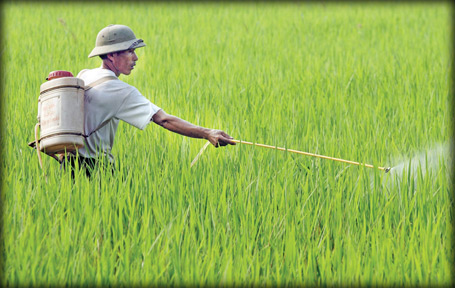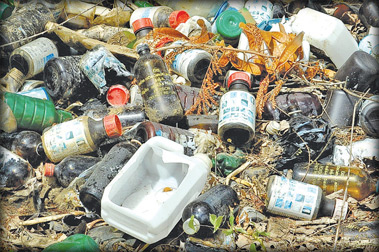Focus on minimising agrochemical use
by Gamini Warushamana
Environment and health issues caused by excessive use of
agrochemicals was discussed in Parliament last week during the debate on
new regulations to control the use of pesticides and weedicides. The new
law has increased the registration fee for agrochemicals and discourages
its use.
 Despite their disagreements on many issues, Members of Parliament in
the Government and the Opposition agreed that the consequence of
excessive use of agrochemicals has now reached alarming proportions. Despite their disagreements on many issues, Members of Parliament in
the Government and the Opposition agreed that the consequence of
excessive use of agrochemicals has now reached alarming proportions.
During the debate it was revealed that over 15,000 tonnes of
agrochemicals are imported annually and some pesticides and weedicides
that were banned in the recent past are available in the market under
different trade names.
Green revolution
According to researchers, the history of agrochemical use in Sri
Lanka goes back to the 1960s. Pesticides had been first used in Sri
Lanka in the anti-malaria campaign to control the malaria mosquito.
Agrochemical use increased after the green revolution where new
high-yield but pest and disease susceptible crop varieties were
introduced. In traditional farming practices agrochemical were not used
at all.
Traditional seed varieties, paddy and other vegetable crops, that
were used by farmers had pest and disease resistant properties.
Labour shortage
In addition environment-friendly traditional methods were used in
pest and disease control.
But as agriculture shifted from subsistence to commercial farming,
none of these methods were practical.
Crops such as pumpkin which was earlier cultivated in chenas are
today cultivated with the high use of chemical
fertiliser and pesticides. Farmers say that the imported hybrid seeds
they use is highly susceptible to pest and diseases.
Weedicide use has increased as a result of labour shortage and
resulting high labour cost.
Paddy farming in the Dry Zone is entirely dependent on weedicides.
Results of recent studies suggest that the main cause for fatal chronic
kidney disease which is widespread in North Central Province and
spreading to other areas are weedicides containing Glyphosate.
No option
As the adverse impact of agrochemical use is visible, people are
concerned about what they consume.
They know that they are taking in poisons with their meals - rice,
vegetables and fruits, but they have no option other than to depend on
what is available in the market.
There are groups that demand a shift to traditional farming practices
and use of traditional seeds, organic fertiliser and traditional pest
and disease control methods.
This is similar to the anti-green revolution campaign that stresses
its negative impacts. However, as we know, the green revolution saved
billions of lives in the world and traditional farming practices alone
cannot feed today's world population of over seven billion.
Knowledge
If the issue is excessive use of agrochemicals, the solution should
be to control its use and minimise adverse consequences. One main reason
for excessive use of agro chemical is lack of knowledge among farmers.
 Most of the farmers we interviewed recently in Galkiriyagama,
Kandalama and Madatugama said that they do not have support from
government institutions and responsible officers to diagnose plant
disease and recommend pesticides or agrochemicals. Most of the farmers we interviewed recently in Galkiriyagama,
Kandalama and Madatugama said that they do not have support from
government institutions and responsible officers to diagnose plant
disease and recommend pesticides or agrochemicals.
The agriculture extension service has been paralysed and it is one
reason for the problems. W.M. Rajapaksa, a farmer in Kandalama, said
that only sales representatives of agrochemical companies come to the
field to recommend pesticides.
Another farmer, W.M. Tharanga said that they themselves decide on the
pesticides with their experience or get advise from the pesticide
trader.
High concentrations
Since the objective of the agro chemical companies is to maximise
sales, overuse of agro chemicals is inevitable.
The way the farmers use these agrochemicals in farming areas is
horrible. Weed control is mainly done by weedicides and at least twice a
year they spray weedicides to the field.
To get faster results they use higher concentrations of pesticides
than the recommended dosage or spray them mixed with kerosene oil or
urea or some other chemical without any scientific rationale or the
least idea of adverse health and environment impact.
Some farmers are so hypocritical that they cultivate separate plot of
land without using agrochemicals for their consumption. Brinjals and
capsicum farmers spray pesticides mixed with beer to get shiny, good
looking vegetables.
Environmental issue
Particles of carbofuran, a banned pesticide, are directly put on
babycorn plants. Spraying pesticides on harvested fruits before it is
transported to the market is a common practise, especially in more
perishable vegetables such as tomatoes.
Dumping of empty agrochemical bottles and cans is another serious
environmental issue and heaps of empty cans and bottles can be seen
strewn around in the main farming areas.
There is no proper collection and recycling system for the empty
containers. Even with the knowledge of the danger and fatal kidney
disease they are experiencing, farmers throw away the empty containers
anywhere they wish. The agrochemical companies which earn billions of
rupees in profit too have not considered their social responsibility.
A Mahaweli Authority official said that attempts to collect and
safely dispose of the hazardous garbage failed due to lack of support
from the farmers.
|

Dumping of empty agrochemical bottles and cans is another
serious environmental issue and heaps of empty cans and
bottles can be seen strewn around in the main farming areas. |
An extensive campaign and green productivity initiative is essential
to tackle this issue, he said.
White revolution
The Deputy Director General (Research) of the Department of
Agriculture, Dr. E.M. Dassanayake said that research is focused on minimising agrochemical use. She accepted that earlier the
department pushed the green revolution and encouraged farmers to use
agrochemicals because the focus was on increasing yield. "Now we focus
on the quality of agricultural products as well and the adverse impact
on health and environment due to the overuse of agrochemicals have been
taken into account.
We encourage farmers to use traditional weed and pest control methods
and this new campaign is called the White Revolution," she said.
Problems
Dr. Dassanayake said that the use of chemicals to artificially ripen
fruits also has serious health implications and the Consumer Affairs
Authority has the power to stop them.
The department has launched a mobile service to educate farmers
including diagnosing plant diseases and recommending suitable pesticides
to address problems in the agriculture extension service. The program
has launched with five vehicles and the service is available in the main
farming areas.
Registrar of Pesticides, Dr. G. A. W. Wijesekara said that the around
7,000 tonnes of agrochemicals is imported and not 15,000 tonnes. The
quantity imported is not much higher compared to other countries.
Agrochemical use in Sri Lanka is 4 kg per acre per year and it is
much lower compared to countries such as Thailand. Some of the banned
chemicals are still available in the market because import was banned
recently and it will take time for stocks to exhaust. |

